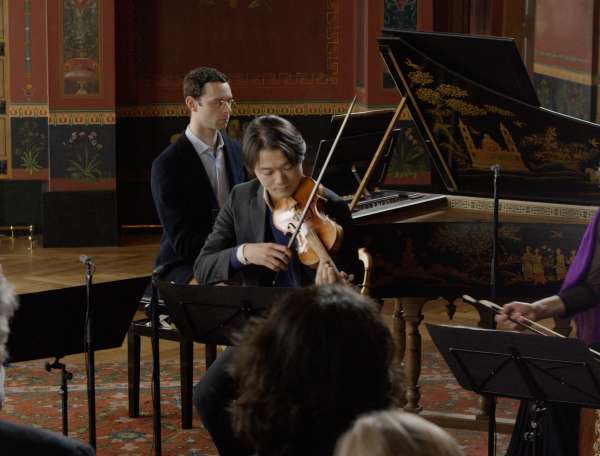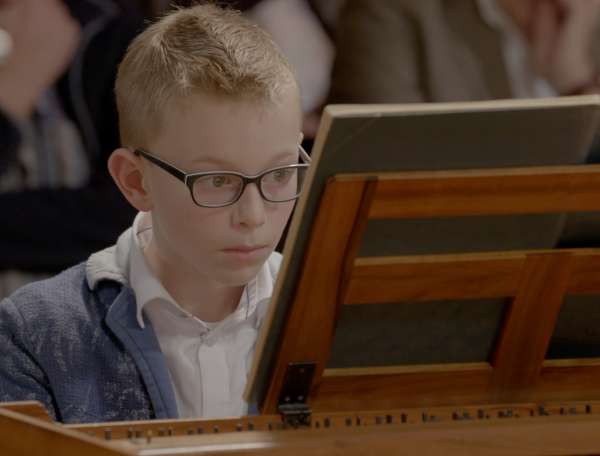

Dir, dir Jehova, will ich singen
BWV 299 performed by Charles Daniels,
Mieneke van der Velden, Menno van Delft and Fred Jacobs
at the Bartolotti House, Amsterdam
Behind the music
Home music
From personal devotion to large-scale community singing
Not only did Bach harmonise existing chorale melodies. He also wrote his own new music for existing chorale texts, as here – in the form of a chorale hymn for singing voice with basso continuo. It is clearly home music, as Charles Daniels explains in his interview. So it is perfectly suited to the eighteenth-century salon in the Bartolotti House.
The great leaps of this hymn’s melody give it a personal and soloist character. You would not immediately associate it with large-scale, public nationalism. Yet this hymn was hugely popular in Germany at the beginning of the twentieth century. Around a hundred years ago, in the middle of World War I, it was performed in Heidelberg at the celebration of the four-hundredth anniversary of the Reformation, for example. Ten years later, Nazi ideologist Alfred Rosenberg considered it a sign of the supposed ‘Jewification’ of Germany that every Sunday “blonde German children” had to sing this hymn in worship of “Jehova”. Fortunately, Bach’s music is able to withstand a dose of nonsense.
The Notenbüchlein für Anna Magdalena Bach
Shortly after their arrival in Leipzig in 1723, Johann Sebastian and Anna Magdalena Bach revealed themselves as a cultural power couple. Although Anna Magdalena gave up her successful public singing career, she joined her husband in running a thriving music business, alongside looking after a large and growing family. We have at least two tangible traces of their married life in the form of two Notenbüchlein from 1722 and 1725.
Whereas the first Notenbüchlein was still a sort of notebook, containing things like early versions of five ‘French Suites’ (and who knows what else, as two-thirds of the pages are missing), the second one was definitely intended as a gift from Johann Sebastian to his wife. In fair copy, he notated two Partitas and all sorts of other music of Anna Magdalena’s own choosing, such as the aria from the Goldberg Variations and the song Dir, dir Jehova, as well as music by composers like Couperin and Anna Magdalena’s stepson Carl Philipp Emanuel. Together, the Notenbüchlein form a colourful mix of arias, chorales and suites.
With support from
Stichting Elise Mathilde Fonds
Extra videos
Vocal texts
Original
Dir, dir Jehova will ich singen;
denn wo ist doch ein solcher Gott wie du?
Dir will ich meine Lieder bringen,
ach, gib mir deines Geistes Kraft dazu,
dass ich es tu im Namen Jesu Christ,
so wie es dir durch ihn gefällig ist.
Zeuch mich, o Vater, zu dem Sohne,
damit dein Sohn mich wieder zieh zu dir;
dein Geist in meinem Herzen wohne
und meine Sinne und Verstand regier,
dass ich den Frieden Gottes schmeck und fühl
und dir darob im Herzen sing und spiel.
Verleih mir, Höchster, solche Güte,
so wird gewiss mein Singen recht getan
so klingt es schön in meinem Liede,
und ich bet dich im Geist und Wahrheit an
so hebt dein Geist mein Herz zu dir empor,
dass ich dir Psalmen sing im höhern Chor.
Denn der kann mich bei dir vertreten
mit Seufzern, die ganz unaussprechlich sind,
der lehret mich recht gläubig beten,
gibt Zeugnis meinem Geist,
dass ich dein Kind und ein Miterbe Jesus Christi sei,
daher ich Abba! Lieber Vater schrei.
Wenn dies aus meinem Herzen schallet,
durch deines heilgen Geistes Kraft und Trieb,
so bricht dein Vaterherz und wallet
ganz brünstig gegen mir vor heißer Lieb,
dass mirs die Bitte nicht versagen kann,
die ich nach deinem Willen hab getan.
Was mich dein Geist selbst bitten lehret,
das ist nach deinem Willen eingericht
und wird gewiss von dir erhöret,
weil es im Namen deines Sohns geschicht.
Durch welchen ich dein Kind und Erbe bin
Und nehme von dir Gnad um Gnade hin.
Wohl mir, dass ich dies Zeugnis habe,
darum bin ich voller Trost und Freudigkeit
und weiß, dass alle gute Gabe,
die ich von dir verlange jederzeit,
die gibst du und tust überschwänglich mehr
als ich verstehe, bitte und begehr.
Wohl mir, ich bitt in Jesu Namen,
der mich zu deiner Rechten selbst vertritt,
in ihm ist alles Ja und Amen,
was ich von dir im Geist und Glauben bitt:
Wohl mir, Lob Dir! itzt und in Ewigkeit,
dass du mir schenkest solche Seligkeit.
Translation
To you, Jehovah, I am singing
For nowhere is a God as great as you;
To you my songs and hymns I'm bringing,
Oh may your Spirit breathe its power through
So that my praise be pleasing, let it rise
Through the blest name of our Lord Jesus Christ.
Draw me, o Father, to your dear Son,
So that your Son will then draw me to you!
O may the Spirit make my heart home
Ruling my mind and all my senses too,
So I can taste and feel your peace divine
And sing you praise with all this heart of mine.
Give me, Almighty God, such blessing,
So that I may bring your praise rightfully;
Hear this in the songs I’m addressing,
In Spirit and in Truth I make my plea:
Your Spirit raise up my heart ever high’r,
So I may sing psalms with the heav’nly choir.
The Holy Spirit can plead for me
With sighs and groans that go beyond all words,
Teach me to pray in faith and truly,
O Spirit, show me so that I can see
That I’m God’s child and an heir with Christ too,
So I can cry “Abba! Father” to you.
When cries from my heart have resounded,
Your Spirit’s power delivers my plea,
The Father’s heart breaks; love unbounded
Ardently pours in warm waves over me,
So that no prayer of mine can ever fail,
If I have made it following your will.
Your Spirit guides me in my praying
Always to ask that the Lord’s will be done.
So you will hear me without delaying
All that I pray in the name of your Son.
Because through Christ I inherit a place
As your own child, receiving grace on grace.
Blest with the Spirit as my witness
Comfort and joy fill me up ever high’r.
I know that gifts of God’s own goodness
All that I ever from you have desir’d
You lavish on me even more from your hand
Than I could ever ask or even understand.
What joy for me, through Jesus praying,
Who stands at God's right hand and pleads for me;
To my pleas, "Yes, let it be” saying,
What I ask Him in spirit, faithfully.
All praise to You for all You give to me
Through all my life, and in eternity.
translation © Ruth van Baak Griffioen, 2019, 2020
Credits
-
- Release date
- 25 January 2019
-
- Recording date
- 12 May 2018
-
- Location
- Bartolotti House, Amsterdam
-
- Tenor
- Charles Daniels
-
- Viola da gamba
- Mieneke van der Velden
-
- Harpsichord
- Menno van Delft
-
- Theorbo
- Fred Jacobs
-
- Director, camera and lights
- Gijs Besseling
-
- Music recording
- Guido Tichelman, Bastiaan Kuijt
-
- Music edit and mix
- Guido Tichelman
-
- Camera, lights
- Nina Badoux
-
- Camera and lighting assistant
- Eline Eestermans
-
- Interview
- Onno van Ameijde, Marloes Biermans
-
- Producer concert
- Marco Meijdam
-
- Producer film
- Jessie Verbrugh
-
- With support from
- Stichting Elise Mathilde Fonds

